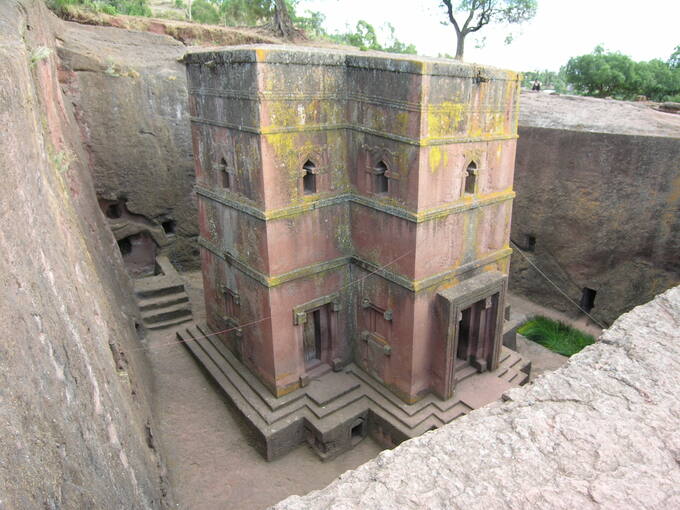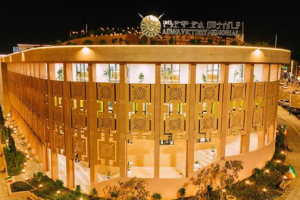
BY TSEGAY HAGOS
Nowadays, tourism is becoming an integral source of foreign currency earning for many countries. According to the World Travel and Tourism Council (WTTC), travel and tourism is the largest industry in the world on virtually and economic measures, including gross output, value added outputs, capital investment, employment, and tax contributions.
Ethiopia is endowed with huge tourism potentials. As the center of ancient civilization, (Aksum was one of the mightiest Empires of the ancient world), its cultural and historical heritages have immense tourism significance. Not only Aksum, Ethiopia is the origin of humanity where the human ancestor Lucy, scientifically known as Australopithecus afarensis is found. The historic wall of Harar, the fortified palace of Gondar, the rock-hewn churches of Lalibela, Sof Omar Cave, Tiya archaeological site, Danakil depression and other cultural and natural tourist attractions are among the innumerable blessings of Ethiopia.
However, due to many factors, Ethiopia has not yet utilized its tourism resources. Lack of infrastructure such as road, water, electricity, telecommunication, hotel and accommodation are notable challenges. Though government and private investors have been striving to address these challenges, huge gaps still remain. Hence, private investors go vocal that the gaps hinder their involvement. If investors do not build needed-facilities like accommodation, tourists will be less interested to elongate their stay. This would hamper the smokeless industry from generating foreign currency earnings as much as it can.
Public Relations Director at Tourism Ethiopia, Fitsum Kasahun admits that lack of basic infrastructural developments have been affecting the industry.
‘‘The Tourism sector has strong connection with infrastructure. For instance, the active basaltic volcano which is found in the Afar state is extremely amazing. It could attract tourists from different parts of the world. But since there aren’t infrastructural facilities, it isn’t being visited as much as expected. Tourists and tour operators have been complaining about the absence of proper infrastructural facilities,’’ he said.
Tourists want to relax themselves when they reach at tourist destinations. Thus, hotels, restaurants, banks, internet and other facilities are vital. These infrastructural endeavors would also initiate tourists to elongate their stay. Nevertheless, due to infrastructural limitations, Ethiopian tourism sector has been hampered.
As to Fistsum, Tourism Ethiopia and other stakeholders are striving to launch basic facilities in tourist destinations.
‘‘Our organization prioritizes expanding global market and searching local market opportunities. Besides, it tries to fulfill basic facilities in tourist destinations.’’
With ensuring sustainable tourism development, local communities could enhance their livelihoods through various income generating mechanisms. The industry would absorb huge number of local employees.
The director states that there is a better infrastructural development in urban areas like Addis Ababa, Gondar and Aksum. On the other hand, there is lingering road problem in places like Sof Omar cave and Lalibela. The road built in such places is not concrete asphalt and accommodation is lacking.
‘’When we talk about infrastructure, it includes internet, bank and electric access. As most tourist destinations lack such basic infrastructures, tourists opt to shorten their stay. Hence, these constraints must be addressed to increase tourist’s influx,’’ as to him.
Tourism Ethiopia is working in collaboration with Ethio-telecom on ways of ensuring internet access in tourism destinations. Though there is delay due to COVID-19 pandemic, an agreement has been signed to install internet access in Harar, Gondar, Lalibela and other destinations. Regarding road infrastructure, we are informed that the Ethiopian Road Authority is including tourist destinations in its 10 year plan, Fitsum points out.
The infrastructural accomplishments which were undertaken in Entoto and Unity-Parks have shown how infrastructure increases tourist flow. Besides, structural changes in Tourism Ethiopia and other stakeholders would have massive role in transforming the industry, Fitsum stated.
Nowadays, COVID-19 is also another challenge to the smokeless industry. It has created damaging effect on the sector. Almost all tourist destinations, hotels, tour and travel companies have stopped operation due to the virus. Consequently, the sector has been severely affected.
According to the director, research is being undertaken to identify and classify heritages. The tourism roadmap which is under preparation would play a pivotal role in developing, preserving and promoting tourist attractions. Hence, the sector could be a driving engine for rapid economic development of Ethiopia.
The Ethiopian Herald 12 March 2021





